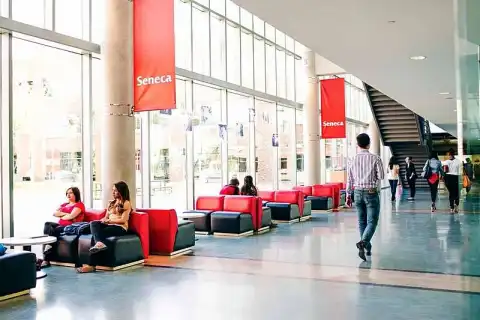Bachelor (Hons) - Behavioural Psychology
- 4 years
- Duration
- 20,117 CAD/year
- Price
- Rolling admission
- Start
- Rolling admission
- Deadline
- Bachelor
- Degree
- Mixed
- Format
- Toronto / Canada
- Location
Program description
In Canada, this is the first four-year undergraduate honors degree program dedicated solely to the rapidly expanding subject of Behavioural Psychology.
Curriculum topics include behavioral intervention, behavioral techniques, and the use of Applied Behaviour Analysis in clinical and non-clinical settings, all of which are grounded in the theory that people learn both adaptive and maladaptive behaviors through their interactions with the world around them. By the time you finish, you will have a solid grounding in the theory, concepts, and applications of behavioral psychology.
Over the past decade, funding for autism spectrum disorder (ASD) programs in Ontario has quadrupled, making them more accessible than ever. One in ten Canadians has a learning disability, and one in five children and adolescents in Ontario struggle with mental health issues.
Skills
Throughout this program you will develop the following skills:
- Developmental and intellectual disabilities
- Autism Spectrum Disorder
- Mental health and neurological injury applications
- Experience in gathering and information to design treatments and interventions
Program structure
Semester 1
- Behaviour Theory and Practice I
- Applied Behaviour Analysis
- Critical Thinking and Writing
- Introduction to Psychology I
- Human Development I
Semester 2
- Experimental Designs in Behaviour Analysis
- Applied Behaviour Analysis II
- Interpersonal Communications
- Introduction to Psychology II
- Human Development II
Semester 3
- Behaviour Assessment
- Interventions I
- Autism Spectrum Disorder and Other Developmental Disabilities
- Abnormal Psychology
- plus: Liberal Studies Course
Semester 4
- Acquired Brain Injury and Rehabilitation
- Ethics in Behavioural Intervention
- Interventions II
- Forensic Behaviour Science
- plus: Liberal Studies Course
Semester 5
- Behavioural Psychology in Context
- Adulthood and Aging
- Introduction to Community Mental Health
- Theories of Counselling
- plus: Liberal Studies Course
Semester 6
- Behavioural Approaches to Counselling
- Behavioural Approaches to Education
- Special Topics in Behavioural Analysis
- Applied Statistics in Social Sciences
- plus: Liberal Studies Course
Semester 7
- Industrial and Organizational Behaviour
- Research Methods
- Mental Health and Addiction: Behavioural Psychology
- Developmental Disabilities and Behavioural Intervention Across the Lifespan
- Work Term Preparation
- plus: Liberal Studies Course
Work-Integrated Learning Term
- Behavioral Psychology, Work Term
Semester 8
- Legislation, Policy and Systems
- Advanced Topic: Behavioural Gerontology
- Research Project
- Seminar: Assessing Complementary Therapies
- plus: Liberal Studies Course
Price
Tuition fees - 20,117 CAD/year
Books and Supply Costs - 750 CAD
Please note: All costs are approximate, may vary by campus and are subject to change at any time without notice.
Requirements for applicants
Academic Requirements:
- High school transcripts for grades 10, 11 and 12 showing all program specific pre-requisite courses.
- Transcripts must include six (6) senior level courses equivalent to Ontario university preparatory credits with an overall average of 65%.
- High school/secondary school diploma (certificate of completion).
- You may submit transcripts or certificates for any completed university/postsecondary college courses or programs taken inside or outside of Canada.
- Academic records that are in a language other than English must include an official/certified English translation.
Seneca reserves the right to verify submitted transcripts at any time. For courses and credentials earned inside of Canada, Seneca reserves the right to request original transcripts be sent directly to Seneca from the issuing institution. Applicants will be notified if this is needed.
English Proficiency Requirements:
If English is not your first language, show one of the following:
- Minimum of two years full-time study in an English-speaking nation
- Minimum one year of full-time postsecondary education in an English-speaking nation
- Successful completion of an intense English program like the English Language Institute
- English proficiency exam results from one of the international testing agencies. Only two-year-old tests are valid.
English language test score requirements
- CAEL CE and CAEL online - Minimum 70 (Writing no less than 60)
- Cambridge English Exams (B2 First/FCE, C1 Advanced/CAE or C2 Proficiency/CPE) - Minimum 176 with no skill below 169
- Duolingo - Minimum score 115 to 120
- IELTS Academic - Minimum 6.5 with no skill below 6.0
- PTE Academic - Minimum score 60
- TOEFL iBT (including MyBest TOEFL and Home Edition) - Minimum 84 with no skill below 21
- TOEFL Revised Paper Delivered - No skill below 21
About the university

A public institution with many campuses in Peterborough, Ontario, and the Greater Toronto Area is called Seneca College of Applied Arts and Technology. At the bachelor, diploma, certificate, and graduate levels, it provides both full-time and part-time programs.
Seneca has been involved in foreign education for many years and today draws over 10,000 students from over 130 different nations each year. Through intense language instruction that may last anywhere from two months to more than a year, Seneca's English Language Institute helps overseas students become ready for post-secondary education. The college has a number of alliances with schools abroad and is growing its efforts in collaborative applied research and work/study abroad opportunities.
Seneca in a Nutshell
- With 30,000 full-time students and more than 70,000 registrations for continuing education each year, this institution is among the biggest in Canada.
- 7,000 foreign students from more than 150 nations make up a diversified student body.
- In terms of connections to other postsecondary institutions, Ontario colleges rank first.
- In Toronto, York Region, and Peterborough, there are ten campuses.
- Every year, on average, 8,000 bursaries and 2,600 Seneca scholarships/awards are given out.





